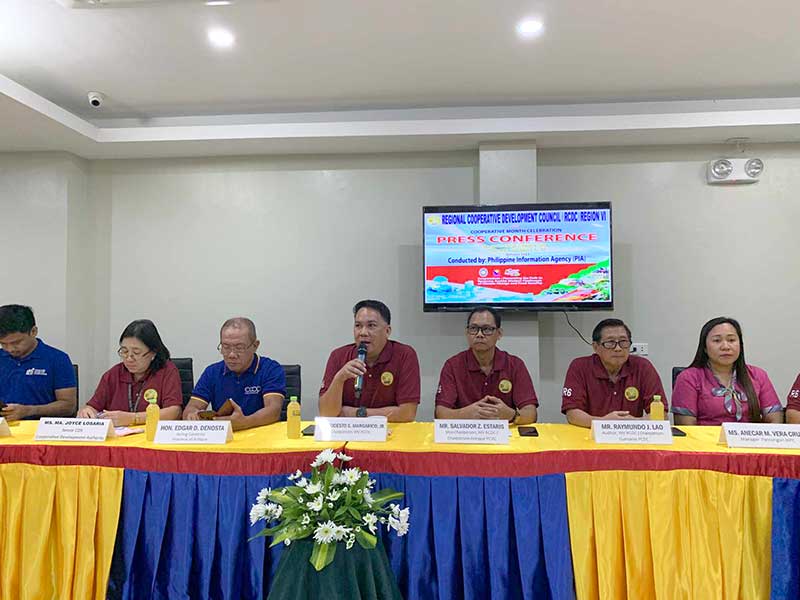
By Rjay Zuriaga Castor
The Cooperative Development Authority-Region 6 (CDA-6) urged members of cooperatives to remain vigilant and actively monitor the transactions within their respective cooperatives to be on guard against fraudulent activities.
“Dapat kamo nga members sang coop dapat aware kamo, vigilant kamo sa kung ano gakatabo sa inyo nga coop […] You have the right to examine the books of accounts,” said Ma. Joyce Losaria, Senior Cooperative Development Specialist (CDS) of CDA-6.
Losaria added that if there are issues or fraudulent activities within the cooperatives, the members should first report it to the mediation and conciliation committee of the cooperative.
Losaria also noted that CDA recognized the “principle of subsidiarity” under which the cooperative sector can initiate and regulate within its own ranks the promotion and organization, training and research, and audit and support services.
“Dapat dira anay ina sila sa ila nga conciliation or mediation committee i-report… Kung indi ma (fix) masaka na ina sa amon ” she explained.
Under Republic Act No. 11364 or the CDA Charter of 2019, the CDA can exercise developmental, quasi-judicial powers, and regulatory functions and responsibilities among cooperatives.
As for its regulatory functions, Losaria said that in every district, CDA is deploying CDS to inspect cooperatives and assist in the preparation of program designs, organization, and registration of cooperatives to enhance cooperative development.
“We have an inspection report that will be submitted and dira ginalantaw nila ang mga tanan […] Every year, as one of the functions of CDA, dapat may ara kami may na field nga CDS nga in charge to conduct inspection every year,” she explained.
The CDA-6 said there are around 1,920 cooperatives registered in the region, with only 710 issued with a Certificate of Compliance (COC).
A COC is issued to operating cooperatives that have submitted to the CDA its Cooperative Annual Progress Report, financial statements audited by a CDA-accredited external auditor, list of officers and mandatory trainings undertaken or completed, performance audit report, semi-annual report on mediation and conciliation; and an annual tax incentive report.
The COC, which has a validity of 1 year, has to be secured 120 days after the close of the fiscal year and has to be submitted online.
After the submission online, the Supervision and Examination Section of the CDA will evaluate the documents submitted by the cooperatives.
The press conference was held as part of the National Cooperative Development Month celebration.
IGEMPC’s case an issue of ‘internal policy’
The financial losses besetting the Iloilo City Government Employees Multi-Purpose Cooperative (IGEMPC) is more of an issue on its “internal policy.”
“It is more on internal. Internal policy na nila. Kung ang coop may ara sang internal policy kag ginasunod man nila… ang internal policy nga na, gina approve man na sang General Assembly,” Losaria said when asked if the CDA will have a more stricter policy on loan processes on members following the loan mess of IGEMPC.
The General Assembly is the highest decision-making body in the cooperative that has the final authority on the management of the affairs of the cooperative.
Meanwhile, Modesto Margarico Jr., chairperson of the Western Visayas Regional Cooperative Development Council (WV RCDC), echoed Losaria’s statements saying, “That is internal. Just like us sa Iloilo Provincial Capitol, we have our own credit policy manual [and] audit policy manual.”
He further encouraged small and micro cooperatives to join CDA’s Koop Kapatid Program to
improve their cooperative management, governance, and business operations through the technical, financial, or other types of assistance provided.
“We encourage that kind of symbiotic relationship when it comes to the structure of the large, medium, small and micro cooperatives. Big brother helping small brother,” he added.
WV RCDC Secretary Sylvia Quinesio underscored the pivotal role of the General Assembly within cooperatives, emphasizing that the body holds the responsibility for safeguarding cooperative investments and resources.
“If you look at the structure of the cooperative, the highest governing body of the coop is the General Assembly because they are the owners of the cooperative. Cooperative is owned, managed, and patronized by its members,” she explained.





















